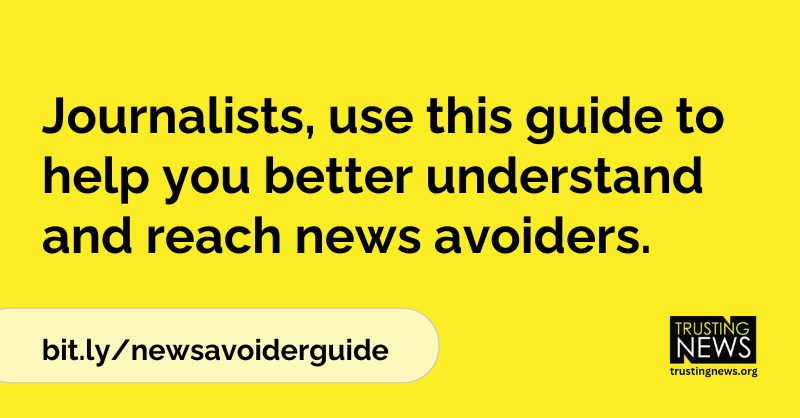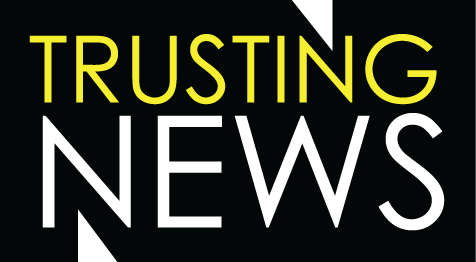
Trusting News is launching a new interview guide designed to help journalists better understand and reach news voiders in their community
Resource: News avoider interview guide
News fatigue and news avoidance are on the rise. Journalists feel it, and the research clearly shows it. The news feels irrelevant, unrelatable, anxiety-inducing and untrustworthy — and that’s causing more and more people to avoid it altogether.
Some quick research links:
- 38% of Americans report they are news-avoidant
- Two-thirds of Americans feel worn out by the news
- 43% report that the news makes them feel worse emotionally
This is harmful, of course, to journalists’ overall relevance and newsrooms’ sustainability. But it also has deeper, and more dangerous, social implications. Newsrooms need to work to be more relevant and accessible to people who are tuning out from the news. A key step in that process is to understand how people are currently perceiving and experiencing the news, and what information needs might be going unmet.
This guide is designed to lead you through an interview or listening session with someone in your community who is not currently engaged with your journalism, or with the news overall. Your goal is to learn about your community members’ perceptions and experiences so you can think about how journalists might evolve to perform a more relevant public service to them.
Through research, we know that journalists simply taking the time to talk and listen to people builds trust and goodwill. In one recent research project, 86% of community members interviewed said they felt a sense of trust building with the reporter or the news organization after the conversation, and 28% said they were considering subscribing. And journalists say it helps them better understand how to serve their audiences. Think about the impact this could have if newsrooms incorporated this practice into their larger efforts and routines? How much benefit could there be if every reporter on staff did this once a month, and looked for themes?
This guide lays out tips for setting up the conversation, as well as suggested questions to help guide your conversation. Questions? Feedback? Email us at info@TrustingNews.org.
Tips for the conversation
- Explain what you’re doing ahead of time. Once you sit down with the person (we recommend these be done in person or over Zoom so you can see body language and facial expressions) explain what you are doing and why. Help set the expectation of what kind of questions you’re going to ask, or send them the questions to review beforehand to help them feel at ease. Also, explain that what they share will not be published without their permission. You’re not there to do a story. You’re there to learn.
- This is not a debate. Your goal is to listen and learn. If the interviewee says things about journalism, or about your work specifically, that you’d like to correct or defend against, try to save those points for the end. We do hope that the subjects’ interactions with you help them understand and relate to journalists, and it’s OK to explain your credibility and best practices. But the primary goal of the conversation is to listen and understand, not bring them to your side, and not to win an argument. If you notice yourself feeling defensive, that’s normal! But keep your eyes on your goals. Think of this as an opportunity to hold your newsroom accountable for issues you may not have considered. People will likely make sweeping generalizations about the media, so try not to take it personally.
- Remember that people who consume news casually or not at all are unlikely to clearly differentiate between types of journalism. If their observations or complaints seem most related to cable TV news, for example, make note of it anyway. If you understand their perceptions, you have the opportunity to show how you’re doing things differently.
- Don’t push too hard for specifics. If they’re casual or infrequent news consumers, they might not be able to tell you why they think something or what specifically bothers them. That’s okay. Learn from the overall observations and emotions.
- Do make note of any specific people, places or organizations they mention as sources of information. They get news on Instagram or TikTok? Ask what accounts. If they say they find out about things by word of mouth, see if they can tell you more.
- Be mindful of your own assumptions about the value of being informed. Journalists can be very judgy about the moral responsibility of citizens to be informed, and judgy about what *not* consuming news says about someone’s intelligence, civic engagement, curiosity, etc. If any of that is true for you, don’t let it show.
- We also encourage you, when appropriate, to acknowledge any place of privilege and positions of power you hold, even as the journalist hosting the conversation. Acknowledge that your news organization may have lost trust over the years, but that you’re striving to do better and want to understand issues facing your community. Remember that they have no obligation to talk to you and are fundamentally doing you a favor.
Who to talk to, and how to find them
The goal of these conversations is to hear from people who don’t feel like consuming news is a meaningful part of their routines or identity. For these interviews, it’s important to look beyond your typical network of sources, commenters or subscribers. You also want to look beyond people you have close social ties with, since hearing you talk about your work has likely influenced their feelings about journalism.
That said, it’s fine to talk to people you know. A neighbor who’s a casual acquaintance could work. So could someone you previously interviewed for a story who was largely or entirely unfamiliar with your coverage. So could someone you know from your own community activities. Another good option is to ask other sources who they know who are not invested in keeping up with the news or who avoid the news because it’s stressful or confusing.
Remember that you are not asking people to speak for entire communities. If you talk to a young person or a person of color, for example, make sure you are not expecting them to represent the views of people like them, and say that out loud if it seems helpful.
Then ask questions
We encourage you to use these questions as a jumping-off point, and to rearrange or reword them so the conversation feels natural. You don’t need to get to all of these questions or ask them verbatim or in order. Prioritize listening attentively to what your interviewee is saying and asking follow-up questions when appropriate.
- When someone talks about the “news”, what comes to mind?
- Tell me about your relationship to the news in general. Where do you typically find information? (Sources could be social media, email groups, friends, etc. — you’re not just looking for the names of news outlets.)
- About what’s going on around town (traffic, restaurants, schools, your neighborhood)?
- About government and politics, locally and nationally?
- About topics you care a lot about (sports, causes, arts, etc.)?
- What social media platforms do you use regularly, and do you look for news there?
- What emotions do you associate with the news?
- Let’s talk about a few things my colleagues have been covering lately (pick 2-3 examples of fairly high-profile stories, across beats). Are those things you’re interested in knowing about? If so, are you actively seeking information about them? Or do you have other ways of finding out what’s going on?
- If you overheard someone mention a topic you’re curious about (a new law going into effect, a new restaurant coming to town, a school shutting down) where would you turn to find more information? Would you like for it to be easier to stay caught up on the news?
- If yes, can you imagine what that might look like?
- If no, can you think of anything in your life you wish it were easier to find out information about?
- Are there things that you think are important but you feel that journalists ignore?”
- Are there things journalists get wrong about people like you or about things in your life (interests, demographics, values, beliefs, etc.)?
- Do you see news positively or negatively contributing to the lives of anyone you know who follows the news? If so, how so?
- Can you think of a time that something important to you, or how you feel about something, was covered well in the news?
- Can you think of a time that something important to you, or how you feel about something, was covered poorly in the news?
- Have you paid more of less attention to the news over time, or has it remained consistent? What factors influenced the changes?
- Is there anything else you’d like to talk about regarding this topic that we have not discussed? Do you have any questions for me?
If you can, gather some specific demographic information to make sure you’re talking to people who are representative of the audiences you’re trying to reach. Things like: Name, age, gender, race, general political leanings, and email or phone number. (Pay close attention to the words they use to describe themselves, and then use those words back to them during the interview. How do they tend to group themselves? How do they label the communities they identify as part of?)
Send a note afterward thanking them for their time. If you can, share an observation about what you learned, what you’ll share with your colleagues or what you will keep in mind in your own work as a result of the conversation.
Note: This guide was created in collaboration with Trusting News partner newsrooms. Have feedback? Suggestions? Reach our team at info@trustingnews.org.
>> Want a printable version of this guide? Download it here.
| At Trusting News, we learn how people decide what news to trust and turn that knowledge into actionable strategies for journalists. We train and empower journalists to take responsibility for demonstrating credibility and actively earning trust through transparency and engagement. Learn more about our work, vision and team. Subscribe to our Trust Tips newsletter. Follow us on Twitter and LinkedIn. |


